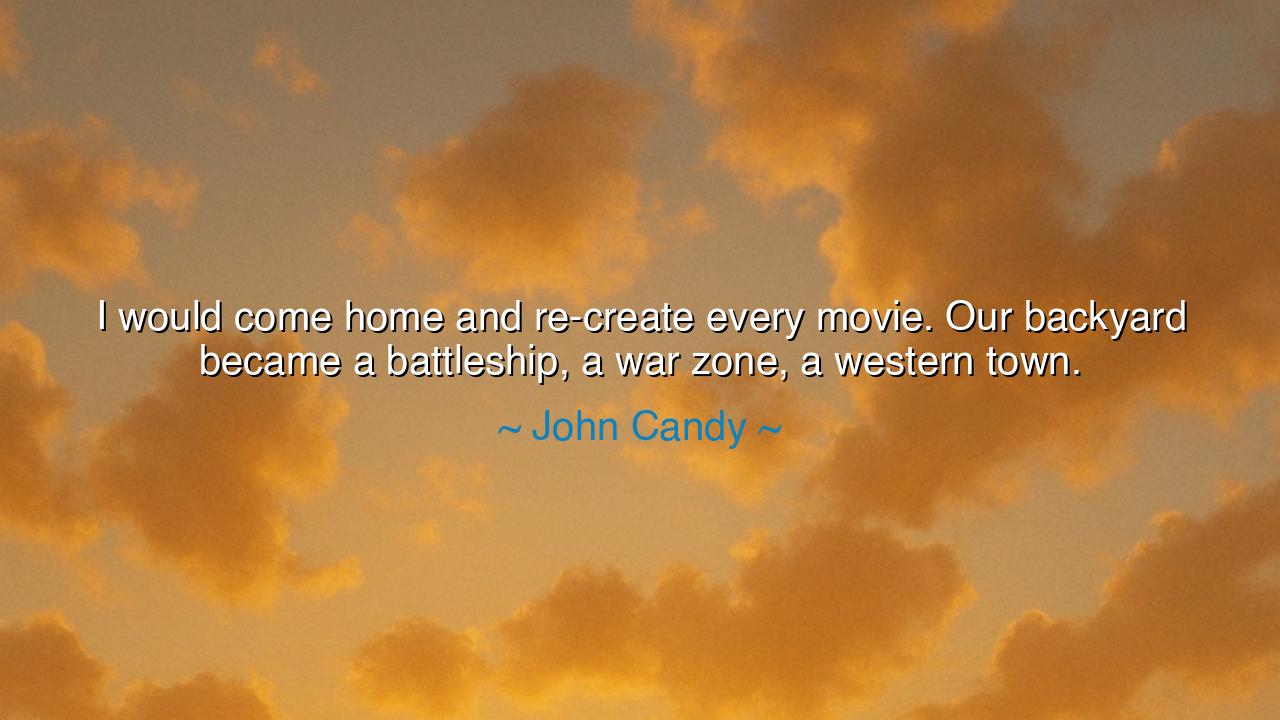
I would come home and re-create every movie. Our backyard became
I would come home and re-create every movie. Our backyard became a battleship, a war zone, a western town.






In the joyful and imaginative words of John Candy, we hear the voice of a soul who never lost his childlike wonder: “I would come home and re-create every movie. Our backyard became a battleship, a war zone, a western town.” Though simple and nostalgic, his reflection reveals something profound — the divine power of imagination and the eternal truth that creativity is not born in luxury, but in the boundless realms of the heart. Candy’s words are not merely about childhood play; they are about the sacred act of becoming — of transforming the ordinary into the extraordinary, of finding meaning and magic in the humble spaces of life.
To re-create is to breathe life into what one has seen, to make the world anew through the eyes of the dreamer. For John Candy, the backyard was not soil and fence — it was an infinite stage, a canvas upon which he rehearsed the roles that would one day make him beloved across the world. The battleship and western town of his youth were not illusions, but expressions of a deeper truth: that creativity begins when we dare to see what others cannot. The wise have always known that imagination is the seed of destiny — that the child who dreams with conviction builds the foundation of the adult who creates with purpose.
The ancients, too, spoke of this power. The philosopher Plato taught that all art begins in imitation — that before we create, we must first envision. Yet he also warned that imitation without soul is hollow. Candy’s backyard, however, was filled with soul. In his play, he was not simply copying what he saw on screen — he was living it, interpreting it, becoming it. This is the secret of all great artists, poets, and visionaries: they do not consume stories merely to repeat them; they inhabit them until new life emerges. In every battleship he imagined, there was courage; in every western town, adventure; and in every act of play, the spark of the man who would later move millions with laughter and heart.
The origin of this quote lies in the innocence of youth — the sacred period when imagination reigns supreme, before the world teaches us to shrink our dreams. John Candy, who grew up in the working-class neighborhoods of Toronto, found in play not an escape, but a training ground for his spirit. He learned to tell stories, to shift between worlds, to see humor even in struggle. That backyard became a mirror of life itself — full of battles, laughter, and transformation. In those early performances, unseen by the world, he was already becoming the artist the world would one day celebrate.
Consider the example of Leonardo da Vinci, who as a child would stare for hours into the flowing rivers of Tuscany, imagining cities and flying machines in the shapes of ripples and clouds. The world saw only water; he saw the future. Like Candy, Leonardo understood that imagination is not escapism, but foresight — the ability to build tomorrow from the clay of today. Both men remind us that the simplest environments — a backyard, a workshop, a notebook — can become the stage for greatness when touched by the creative soul.
In Candy’s words, there is also a profound nostalgia — the ache of one who remembers the pure joy of creation before it was weighed down by expectation. His reflection is both a celebration and a lament: a reminder that adulthood often dims the flame of imagination that once burned so easily in childhood. The battleships and war zones of youth give way to the quiet routines of life; yet the wise know that to truly live, one must never let that flame die. To keep the heart young is not to be childish, but to remain open — to see potential in the mundane, adventure in the ordinary, and magic in the familiar.
Let this be the lesson: the imagination is the soul’s engine, the divine gift that transforms limitation into possibility. To lose it is to live half-awake; to nurture it is to dwell in endless creation. Whether you are an artist, a worker, or a dreamer, find your “backyard” — that sacred space where your spirit is free to play, to build, to imagine without fear of judgment. It need not be a physical place; it may be a corner of your mind, a quiet hour, a moment of inspiration.
Action to take: revive the child within you. Allow yourself to dream boldly again. Turn your routines into stories, your work into art, your surroundings into worlds unseen. For as John Candy teaches us, greatness begins not on the grand stage but in the small corners of life, where imagination first whispers, “There is more here than meets the eye.” And those who listen to that whisper — who can still turn a backyard into a universe — will never lose the light of creation, no matter how old they grow.






AAdministratorAdministrator
Welcome, honored guests. Please leave a comment, we will respond soon